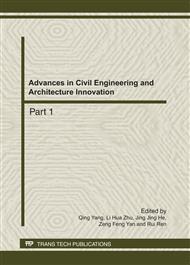[1]
R.Z. Wang. Research on the Energy Efficiency Technologies of Green Residential Buildings in Changchun [D]. Jilin Institute of Architecture and Civil Engineering: Master Dissertation. 2008.
Google Scholar
[2]
G. Zhao. The building energy conservation and the energy for energy efficiency. [J]. Sci /Tech Information Development & Economy, Vol.13 (2005), pp.147-148.
Google Scholar
[3]
Quan-ming Zhang, Zheng-zhong Zeng. Water Resources Assessment [M]. Lanzhou university press: Lanzhou China.1995.
Google Scholar
[4]
Jian-xin Zhang, Da-wei Zheng. Progress of rainwater harvesting in the world [J]. Sichuan Water Conservancy, 2004, (Z1):61-63.
Google Scholar
[5]
Qi-jun Li, Wu Che. Technologies and countermeasures of rainwater utilization in cities of Germany [J]. Urban Environment & Urban Ecology, 2001, 15(1):47-49.
Google Scholar
[6]
Wu Che, Qi-jun Li. Recent Status and Prospect of Urban Rainwater Utilization [J]. Water&Wast- ewater Engineering, 2002, 28(3):12-14.
Google Scholar
[7]
Qian-jin Shi, Qiang He, Hong-xiang Cai. On water saving and water resources design for green- residential quarter [J].Water & Wastewater Engineering, 2008, 34(1):77-79.
Google Scholar
[8]
Ning Wang, Feng Wang, Hai-zhen Yang. Analysis and comparison of the water-saving index in thegreen building evaluation system around the world [J]. 2009, 35(11): 44-48.
Google Scholar
[9]
Tai-bing Wei, Heng-shen Ma, Chang-zhen Zhu. Sustainable development of landscape architec- ture evaluation system [J]. Shanxi Architecture, 2005, 31(6):51-54.
Google Scholar
[10]
Qi Zhang. An Analysis of Green Buildings & Evaluation Systems [J]. 2010, 5(2), pp.33-35.
Google Scholar


